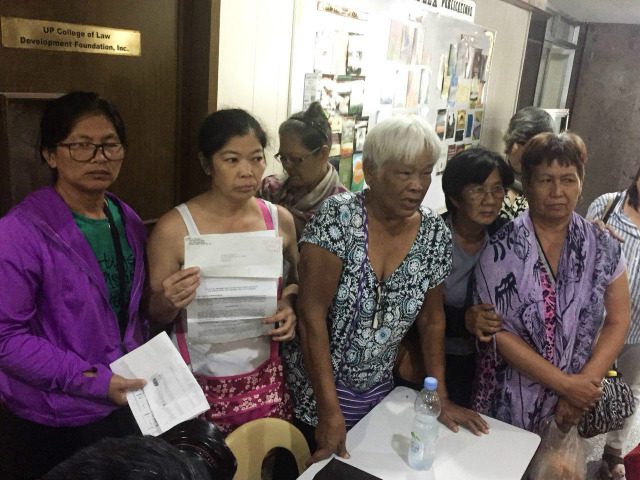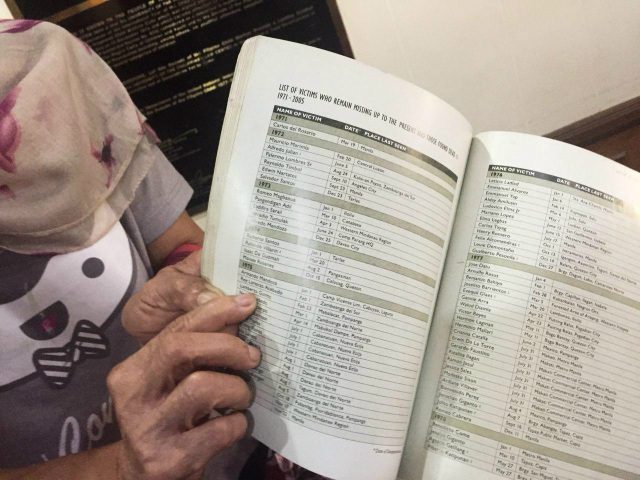SUMMARY
This is AI generated summarization, which may have errors. For context, always refer to the full article.

MANILA, Philippines – It’s been 44 years since Lamberto Guinto disappeared following his arrest in Mabalacat, Pampanga, but justice, even in the form of compensation, still remained elusive.
A desaparecido (disappeared), Guinto’s name is recognized in events at the Bantayog ng mga Bayani and is recorded in various documents detailing the abuses under Martial Law. But these were not enough to qualify his family for compensation – they were excluded in all 3 rounds of money distribution to human rights victims of the late dictator Ferdinand Marcos.
“Nag-file kami, nag-submit ng documents, pero na-deny (We filed, we submitted documents, but we were denied),” Guinto’s wife, Luzviminda, said on the sidelines of a forum in Quezon City on Tuesday, July 9.
Like Luzviminda, Helena Jimenez is also from Central Luzon. Her husband disappeared following his arrest on August 17, 1985.
“Marami po kami sa Region 3 ang na-delist, Missing ang mga asawa namin. Hanggang ngayon wala pa kaming katarungan. Marami sa aming mga na-deny ang totoong biktima,” she said.
(There are a lot of us from Region 3 who were delisted. Our husbands missing. Until now we have no justice. There were a lot of true victims who were denied.)
Jimenez said she only received compensation once, through Republic Act No. 10368 or the Human Rights Victims Reparation and Recognition Act of 2013, managed by the now-defunct Human Rights Victims’ Claims Board (HRVCB).
In April 2019, a New York federal court ordered the distribution of $13.75 million to Marcos human victims. Jimenez, however, was not awarded compensation as part of the class suit filed in Hawaii in 1986 despite being one of the claimants.

Following court orders
Some of the reasons cited was the apparent lack of paperwork or the stringent process that require documentary evidence. Letters seeking additional documents were not received, according to some.
“Noon, kapag kinuha ang kapitbahay mo, kanino ka magsusumbong? Sinong pagsusumbungan mo? Bukas paglalamayan ka (When your neighbor is abducted, who will you go to? If you do, tomorrow you will be dead),” Jimenez said.
During the forum, American lawyer Robert Swift said that there was not much he could do as he had to abide by a court order.
“I would have been delighted to only require the 1993 class filing but the court required the second filing,” he said. “It wasn’t until 2011 when there was money to distribute that the court made the ruling as to eligibility, saying that people must have filed in both years.”
A long-time human rights lawyer, Swift led the team that worked on the Hawaii class action suit and other cases seeking compensation for the victims.
He had been involved in the legal work related to the Marcoses since the late 1980s.
“One of the issues is…in litigation, you don’t always get what you want,” he said. “You try very hard but it’s ultimately up to the court to decide that.”
Help in livelihood
Swift and his team had been going around the country since March to distribute checks personally to at least 6,500 victims, with each expected to receive $1,500 (P75,000). They estimate to reach 16 areas with the help of Claimants 1081, an organization of Martial Law victims.
The HRVCB, meanwhile, had ceased operation after granting and awarding monetary reparations to 11,103 claimants out of 75,730 who applied.
The victims and families who were unable to get any money still hoped for a favorable outcome in the coming years.
“Ang pinakikiusap namin, ang mga na-deny na totoong biktima, sana bigyan ng kaunti. Iyong ibibigay na tulong ng obyerno, hindi sapat na kabayaran pero dahil sa hirap ng buhay, konting tulong pagdugtong ng kabuhayan,” Jimenez said.
(Our plea is that the real victims who were denied would given even a little compensation. The help that the government will give may not be enough to compensate for the lost of a loved one, but because of how hard life has become, a little help provides a lifeline.
Considered as a dark chapter of Philippine history, at least 70,000 people were imprisoned, 34,000 tortured, and 3,240 killed under Martial Law. – Rappler.com
Add a comment
How does this make you feel?
There are no comments yet. Add your comment to start the conversation.